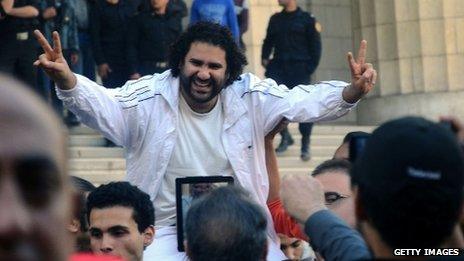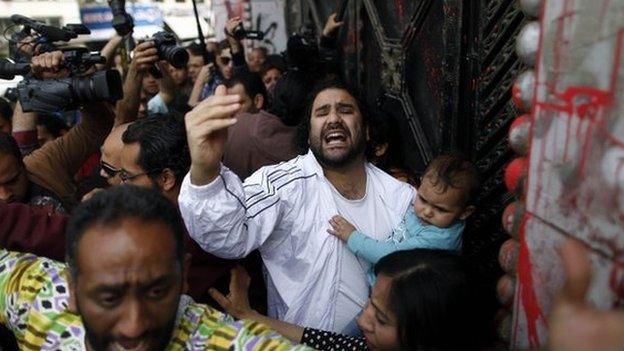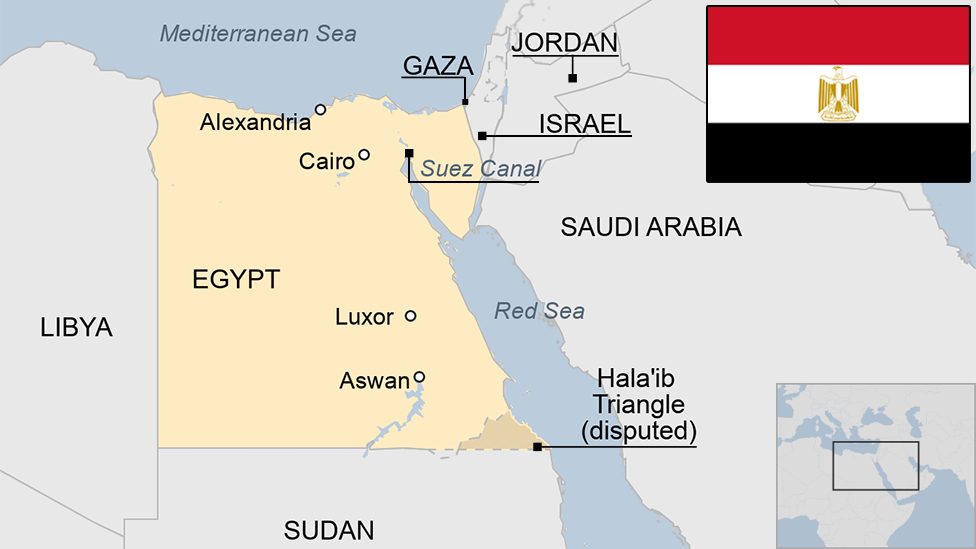Egyptian social media abuzz over arrest of blogger
- Published

Alaa Abdul Fattah after his release from prison in March
Egyptian social media users have lost little time in reacting to the arrest of prominent blogger Alaa Abdul Fattah, who was detained by police at his home in Cairo on Thursday night.
There have been a number of calls for his release, although some users feel that the pro-democracy campaigner brought the arrest on himself with his calls for protests in defiance of a new law restricting demonstrations.
'FreeAlaa'
Calls for Mr Abdul Fattah to be freed started circulating on social media immediately after news of his arrest broke.
The pro-Muslim Brotherhood Twitter account Rabaa Heroes (@RabaaHeros) tweeted in Arabic: "Freedom to Mr Alaa Abdul Fattah"
On her English-language blog Egyptian Chronicles, external, Zeinobia wrote under the headline "#FreeAlaa Hashtag is back once again" that "Alaa should return back to Manal [his wife] and Khaled [his son]".
The pro-Mohammed Morsi journalist Salamah Abdul Hamid (@salamah) tweeted in Arabic: "While writing the hashtag #freedom_foralaa put beside it #freedom_fordetainees and keep the bracket open #Egypt."
'Fighting the revolution'
Many social media users accused Egypt's interim government of seeking to undermine the January 2011 popular uprising that toppled former Egyptian president Hosni Mubarak. Mr Abdul Fattah played a leading role in that revolt.
Blogger Mahmud Bilal (@M7mod_Blal) tweeted: "The Interior [Ministry] arrested Alaa Abdul Fattah and let [leading Salafist figure] Asim Abdul Majid escape. The Interior [Ministry] is not fighting terrorism. It is fighting the January revolution."
Ahmad Dumah (@ahmeddouma), a pro-democracy activist, accused the government of intimidation. "Everything that happened with Alaa Abdul Fattah is a crime. The authorities' repression and terrorism will not scare us. We have spent more time in prison than at home," he tweeted.
On Egyptian Chronicles, Zeinobia expressed her disapproval in even stronger terms: "This is not about a freaking unauthorised protest with my all due respect… By the way anyone is tweeting anything in English is attacked."
Others accused Egyptian armed forces chief Abdel Fattah al-Sisi and the government of repeating the mistakes of the Muslim Brotherhood, which held power under President Morsi from June 2012 until the military deposed him in July 2013.
"Unfortunately, Sisi, his military and his Interior [Ministry] are obviously going the same way as the Brotherhood in following the path of exclusion; you are destroying everything you achieved; wake up now or you will regret it," actor and media celebrity Khaled Abol Naga (@Kalnaga) tweeted.
The Muslim Brotherhood seemed keen to use Mr Abdul Fattah's arrest as political ammunition against the security forces, which it accuses of deposing Mr Morsi in a military coup.
The Brotherhood's Freedom and Justice Party posted a picture on its Facebook page, external of Mr Abdul Fattah in the dock, accompanied by the following caption: "Political activist Alaa Abdul Fattah arrested after his apartment was stormed… Activists say the forces of the coup assaulted his wife."
Support for protest ban
However, some social media users were rather less sympathetic towards Mr Abdul Fattah.
Political activist Hazim Abdul Azim (@Hazem_Azim), who has expressed firm support for the army since President Morsi's ouster, tweeted in Arabic: "Alaa Abdul Fattah had been insulting Sisi with the worst language for a while and it was his wish to be arrested and here it is fulfilled!! #Egypt."
A number of ordinary social media users expressed a similar sentiment.
The privately-owned ON TV Live, external highlighted a tweet by Mr Abdul Fattah in which he said that he refused to abide by any protest law.
The presenter adopted a negative tone when referring to this tweet, and said that everyone should abide by the law.
The presenter also said that the Egyptian government should apply the protest law firmly in order to maintain law and order.
BBC Monitoring, external reports and analyses news from TV, radio, web and print media around the world. For more reports from BBC Monitoring, click here. You can follow BBC Monitoring on Twitter , externaland Facebook, external.
- Published29 November 2013

- Published2 January 2024
